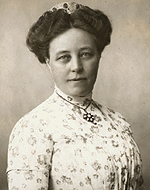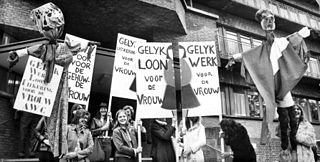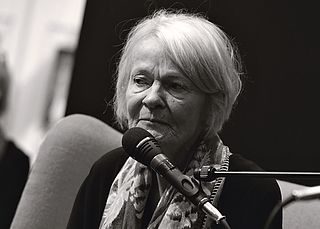Related Research Articles
Redstockings, also known as Redstockings of the Women's Liberation Movement, is a radical feminist nonprofit that was founded in January 1969 in New York City, whose goal is "To Defend and Advance the Women's Liberation Agenda". The group's name is derived from bluestocking, a term used to disparage feminist intellectuals of earlier centuries, and red, for its association with the revolutionary left.

Elna Munch née Sarauw was a Danish feminist and politician,. She was the co-founder of the Landsforbundet for Kvinders Valgret or LKV (1907), the more radical of the two main Danish suffrage movements, and alongside Johanne Rambusch its leading member.

The modern-day character and the historical status of women in Denmark has been influenced by their own involvement in women's movements and political participation in the history of Denmark. Their mark can be seen in the fields of politics, women's suffrage, and literature, among others.
Drude Dahlerup is a Danish-Swedish professor of Political Science at Stockholm University. Her main research area is gender and politics. She is an international consultant on the empowerment of women in politics and a specialist on the implementation of gender quota systems. Spokesperson for the EU-critical center-left June Movement during four Danish referendums in the 1990s.
Vibeke Vasbo is a Danish writer and women's rights and LGBT rights activist. In the early 1970s, she participated in the Redstocking movement and in the Danish Lesbian Movement. She embarked on a literary career in 1976 with Al den løgn om kvinders svaghed expanding on the work of a woman crane driver, based on her experiences in Oslo in 1974-75.
The Lesbian Movement was a Danish organization for lesbians established in 1974 in Copenhagen by a group of women including Vibeke Vasbo who were unhappy about the degree of intolerance towards lesbians in the Danish Redstocking Movement.
Karen Syberg is a Danish author, gender researcher and feminist. In 1970, she was among those who founded the Red Stocking Movement in Denmark. She has since worked as a journalist and author of both fiction and non-fiction.
Ulla Dahlerup is a Danish journalist, writer and women's rights activist. She was one of the most prominent members of the Danish Red Stocking Movement in the early 1970s, an episode she used as a basis for her 1979 novel Søstrene. More recently, she has campaigned for the Danish People's Party.
Bente Hansen was a Danish writer, editor and women's rights activist who was a prominent supporter of the Danish Red Stocking Movement from 1970. She published a number of books on socialism and the role of women and was coordinating editor of the daily newspaper Information in the mid-1970s, giving special attention to social movements.
This is a timeline of women in Denmark, noting important events in Danish women's history.´

Inge Biehl Henningsen is a Danish statistician, academic and writer. A former researcher and lecturer at the universities of Copenhagen and Aarhus, she has also been active in politics and women's rights, most recently in connection with the PISA approach to student assessment. As editor of the socialist journal Naturkampen in the 1980s, she covered subjects as varied as the management of cancer research and the European Union's approach to agriculture in the third world.

The women's liberation movement in Europe was a radical feminist movement that started in the late 1960s and continued through the 1970s and in some cases into the early 1980s. Inspired by developments in North America and triggered by the growing presence of women in the labour market, the movement soon gained momentum in Britain and the Scandinavian countries. In addition to improvements in working conditions and equal pay, liberationists fought for complete autonomy for women's bodies including their right to make their own decisions regarding contraception and abortion, and more independence in sexuality.

Vibeke Ingeborg Salicath née Frisch (1861–1921) was a Danish philanthropist, feminist and politician. From the 1890s, together with her sister Gyrithe Lemche, she was an active member of the Danish Women's Society where from 1901 she edited Kvinden & Samfundet.

Anna Westergaard (1882–1964) was a Danish railway official and a highly influential women's rights activist. Working for the Danish State Railways where she later became a traffic supervisor, she became a board member of the Danish Railways Union (Jernbaneforeningen) and of the Danish Civil Servants Union. A strong proponent of equal rights for men and women in education and the labour market, she was a key contributor to management of the Danish Women's Society (1919–1924) and the Women's Council in Denmark (1938–1946). Westergaard represented Danish women's interests in discussions at the League of Nations in the mid-1930s. From 1937 to 1960, she was president of Open Door International for the Economic Emancipation of the Woman Worker. Politically, she belonged to the Danish Social Liberal Party and was an alternate in the Upper House or Landstinget from 1939 to 1953.
Birgitte Possing is a Danish historian who has specialized in historical biography. In 1992, paying special attention to aspects relating to gender, she earned a doctorate with Viljens styrke, a biography of the pioneering feminist and educator Natalie Zahle. Possing has headed the manuscript department of the Danish National Library and coordinated research at the National Museum of Denmark. From 2000 to 2004, she was director of Danmarks Humanistiske Forskningscenter after which she was appointed senior researcher at the Danish National Archives. In the late 1990s, while collaborating with Kvinfo on Dansk kvindebiografisk leksikon covering women's biographies, Possing identified 1,140 Danish women of historical importance who had not been included in the authoritative biographical dictionary Dansk Biografisk Leksikon.

Vibeke von Sperling was a Danish newspaper and broadcast journalist. She began working as a teaching assistant teaching about the Central and Eastern Europe as well as the Soviet Union at Aarhus University and Roskilde University before joining the staff at Dagbladet Information newspaper in 1978, where she would become its editor-in-chief in 1983. Sperling began working for DR Radio in 1987 until she joined the newspaper Politiken and became the first female foreign affairs editor at a Danish national newspaper while there in 2000 before becoming a foreign employee and commentator at the publication in 2003. She was the author of ten books on Eastern European politics, Russia and Yugoslavia.
Signe Arnfred is a Danish sociologist, feminist and writer who in 1971 became closely involved in Danish feminist activities. A leading figure in the Red Stocking Movement, she organized and participated in meetings and seminars which formed the basis of gender studies in Denmark. In the 1980s. together with her husband she spent four years in Mozambique where she was instrumental in developing a new approach to women in politics. In the late 1980s and early 1990s she was also active in Greenland. Arnfred has published books and articles addressing the place of women in society.
Anna Lise (Nynne) Koch (1915–2001) was a Danish feminist, writer and a pioneering researcher in gender studies. After publishing novels in the 1950s, she joined the Royal Danish Library in 1961 where she paved the way for establishing Kvinfo, the Danish Centre for Research on Women and Gender. In the early 1980s, she organized courses on women's studies (feminologie) at the People's University (Folkeuniversitetet) in Copenhagen and edited the journal Forum for Kvindeforskning. Recognizing her contributions to women's studies, Roskilde University awarded her an honorary doctorate in 1986.
Eva Tjuba Hemmer Hansen (1913–1983) was a Danish journalist, novelist, translator and feminist. While working for the newspaper Demokraten, in 1944, she published Helene, the first in a series of novels, several of which proved popular. As a social democrat, she played particular attention to women's issues, chairing the party's women's committee for the Aarhus City Council. She later left the party in order to support the women's cause. In 1968, she was appointed chair of the Danish Women's Society, compiling a history of the organization in connection with its 100th anniversary in 1970. A highly active translator, in 1975 she published a new Danish edition of the collected works of Charles Dickens.
References
- ↑ Dahlerup, Drude. "Rødstrømpebevægelsen". Den Store Danske. Retrieved 27 May 2017.
- 1 2 3 4 "Rødstrømperne og den nye kvindebevægelse, ca. 1970-1985". Danmarks Historien. Retrieved 27 May 2017.
- 1 2 "Rødstrømpebevægelsen" (in Danish). kvinfo. Retrieved 27 May 2017.